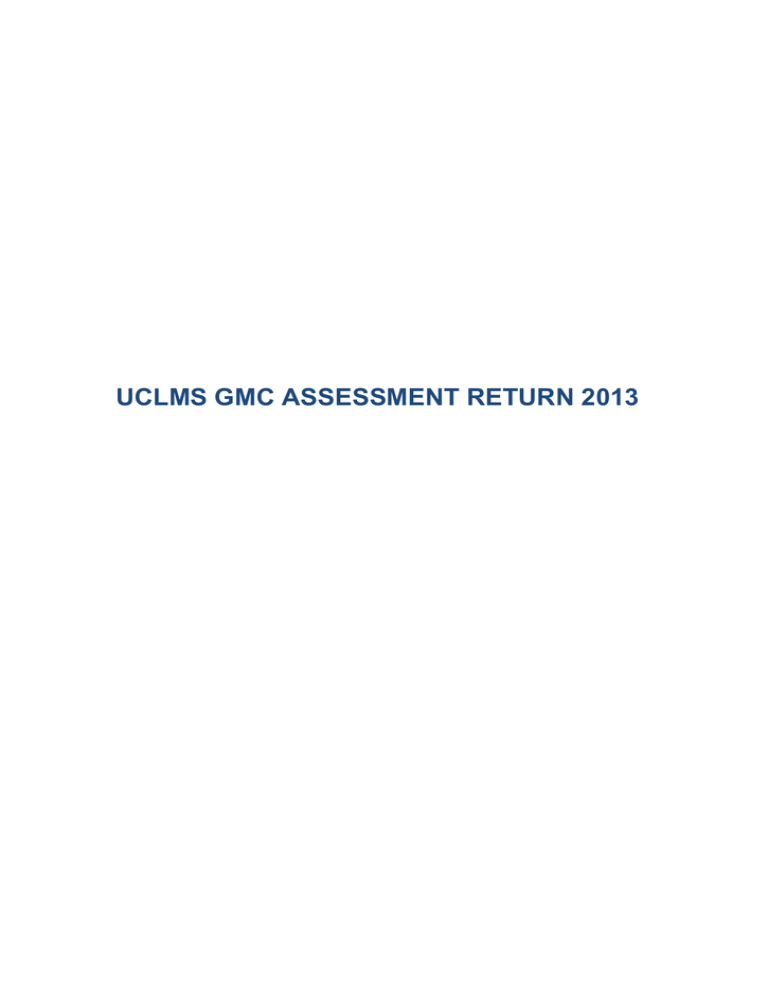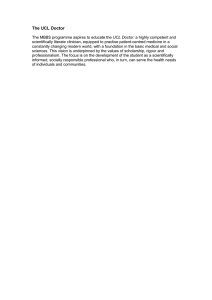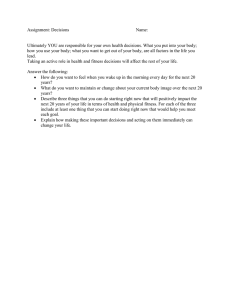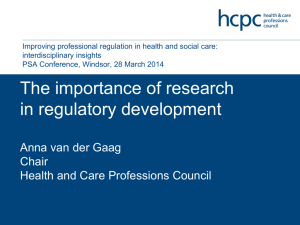UCLMS GMC ASSESSMENT RETURN 2013
advertisement

UCLMS GMC ASSESSMENT RETURN 2013 Question Response 1. Please provide an assessment calendar showing your assessments across all years of the programme. Please find and assessment calendar identifying formative and summative assessment dates across all years of the programme. We also include a timetable for 2013/14 to illustrate how assessment periods relate to the curriculum in each year. Please note that in Year 1 & 2 the summative assessment window is identified: the actual dates are yet know to be confirmed by College. Some formative and on-going assessments also take place outside of this calendar: In Year 1 and 2: Consolidation, Integration and Feedback weeks (CIF) include formative assessments and feedback. A number of formative ‘spotter tests’ in anatomy and imaging take place outside of CIF weeks. In Years 4-6 students use the UMeP to collect and record SLEs and end of module sign off and feedback Throughout all years students complete a portfolio and record of completed procedures card. Portfolio items include reflections, selfassessments, peer assessment and a small amount of required course work. These are submitted before entry to the summative assessment each year. We analysed our evidence regarding your assessment blueprinting. We were pleased to see the quality of your processes and we were happy that you are meeting our standards in these areas Doc ref. Document 1- 1314 Medical School Assessment dates Document 2 – 1314 MBBS Overall Timetable Document 12 - 1314 MBBS 7 MBBS Examination Boards and Mark Schemes Sept 13 Question Response Doc ref. 2. Please provide reliability data for your OSCE assessments for 2011/12, or 2012/13 if available. Please find the reliability data for summative OSCEs in Years 4-6 for 2012/13 Please note that OSCEs in Years 1 and 2 were newly introduced in 2012/13 as a piloting and pathfinder project and are currently formative assessments. 3. Please provide your standard setting reports for your OSCE assessments for 2011/12, or 2012/13 if available. Standard setting for clinical examinations (OSCEs) The pass mark for the clinical examinations in Years 4-6 is calculated using a borderline group method of standard setting. A global judgement for overall performance on each OSCE station is given in addition to the station score. This can be: Pass, Borderline Pass, Borderline Fail or Fail. All station scores for all candidates whose global judgements are in the Borderline Pass and Borderline Fail groups are totalled and averaged. The pass mark for the OSCE is the mean of these station scores. Please note, as already highlighted, OSCEs in Year 1 and 2 were newly piloted in 2012/13 and remain formative. Pilot data concerning standard setting and station performance is available on request. The SEM calculated is from data in accompanying reports using formula below SDev from Speedwell stats: SSO SD Raw Cronbach's reliability coefficient from Speedwell stats: 1 Corr Coeff SqR of 1 reliability coefficient: SQRT 1 Corr Document 3 - Statistical Analysis Yr4 OSCE 1213 Document 4 - Statistical Analysis Yr5 OSCE 1213 Document 5 - Statistical Analysis Yr6 Short OSCE 1213 Document 6 - Statistical Analysis Yr6 Long OSCE 1213 Document 7 - Standard Setting 2013 Question Response Doc ref. Coeff SEM = Sdev x sqr root (1- reliability coefficient): Based on raw scores so SEM divided by total questions*100: SEM % of OSCE total 4. Please provide any station level analysis of OSCEs conducted in 2011/12, or 2012/13 if available. Please find 2012/13 Station level analysis for Years 4-6 OSCEs. Pilot data for the newly introduced formative OSCEs in Year 1 and 2 are available on request. 5. Please provide any analysis you have carried out of the correlation We have interpreted this request to mean correlation between performance of candidates in a given cohort in each of the summative assessment tools. In Years 1 and 2 there are two SBA written papers and a data interpretation and anatomy and imaging practical exam. Document 8 - Station Histograms Yr4 OSCE 1213 Document 9 - Station Histograms Yr5 OSCE 1213 Document 10 - Station Histograms Yr6 Short OSCE 1213 Document 11 - Station Histograms Yr6 Long OSCE 1213 Document 3 - Statistical Analysis Yr4 OSCE 1213 Document 4 - Statistical Analysis Yr5 OSCE 1213 Document 5 - Statistical Analysis Yr6 Short OSCE 1213 Document 6 - Statistical Analysis Yr6 Long OSCE 1213 Document 12 - 1314 MBBS 7 MBBS Examination Boards and Mark Schemes Sept 13 Question between the performance of assessments. Response In Years 4&5 there are two SBA papers and an OSCE In Year 6 there are to two SBA papers and two OSCEs. Years 1 and 2: In 2012/13 we carried out a correlation between the two Year 1 summative Single Best Answer papers. There was a strong and highly statistically significant correlation (r=.811; p<.001; n=330). In Year 2 we correlated the results of the two Year 2 summative Single Best Answer papers and the Data Interpretation paper. The correlation between the SBA papers was strong and highly statistically significant (r=.781; p<.001; n=313) and the correlations between each SBA and DI papers were slightly lower but still strong and highly statistically significant (SBA 1 r=.666; p<.001; n=313; SBA2 r=.690; p<.001; n=313). Overall this suggests that the SBAs are measuring very similar knowledge and skills, and to a similar standard; and that the knowledge and skills measured by the Data Interpretation paper are slightly different, as expected and desired. Years 4/5 and 6: There is only one written paper in each year and either one [Year 4 and 5] or one [Year 6]. We believe these test difference aspects of performance and do not routinely correlate these scores. Doc ref. Document 23 – Yr6 Statistics Comparison 2006-2013 Question Response Doc ref. 6. Please provide the school's policy on resitting high stakes assessments. How does the School use mitigation to inform its decisions? The mark schemes in each year of the programme permit a second attempt at all summative examinations which determine progression to the next year of the programme or qualification. In Years 1 and 2, the second attempt is within the same session except where extenuating circumstances indicate that a repeat year of study is needed. In Years 4 and 5, the second attempt is after a repeat year of study. In Year 5, candidates who fail at the first attempt are permitted a second attempt but those who have previously failed and repeated 2 years of the programme are not permitted to re-sit. In Year 6, candidates in Group 2 (Fail) may choose to re-sit during the same session or to repeat a year, and candidates in Group 3 (Clear Fail) are strongly advised to repeat a year before re-sitting. Document 13 - UCLs Academic Regulations for Students Discretionary 3rd attempts may be granted on a case-by-case basis where Year Exam Boards make recommendations of support after consideration of standardised welfare reports which are drawn up at a Pre-Examination Board on the basis of performance during the course, welfare issues and extenuating circumstances. Examination Board recommendations must then be approved by the Faculty Tutor and ratified by the UCL Dean of Students. UCL regulations require Examination Boards to consider extenuating circumstances and mitigation is used in the MBBS to inform 1) merit awards and ranking for candidates at cut-off points and 2) pass/fail decisions for candidates whose overall marks place them in Group 2 (Fail), where mark schemes allow Examination Boards discretion to condone a pass or confirm a fail. Mitigation takes the form of a recommendation of “strong”, “some” or “no” support based on the standardised welfare reports mentioned above, which are determined at a Pre-Examination Board without knowledge of Document 15 - 1213 Agenda Pre-Exam Board Meeting Candidate Report Template Document 16 - 1213 Agenda Pre-Exam Board Welfare Meeting Question Response candidate performance and which include a required UCL extenuating circumstances tariff of A,B,C,X reflecting the severity of the potential impact on candidate performance. Doc ref. 7. Please provide an overview of the school’s regulations on student progression (specifically, the impact of academic failure, professionalism concerns or health problems) Please refer to Document 12, page 22-38. The school uses two parallel processes for making decisions about progression: the academic progression requirements identified in previous sections, and the fitness to practice concerns process. The school uses a Close Supervision policy, which includes regular supervision and learning agreements in cases of academic failure, health problems and concerns about fitness to practice. Document 12 - 1314 MBBS 7 MBBS Examination Boards and Mark Schemes Sept 13 Years 1 and 2: A student’s Fitness to Practise relates to both their health and their conduct. Fitness to Practise concerns will be considered by the Sub Boards of Examiners in determining Pass/Fail results in Years 1 and 2. These concerns are normally communicated via Fitness to Practice concerns forms (‘pink forms’). Occasionally serious fitness to practise concerns will be raised during the academic year and this process is over seen by the Faculty Tutor If a Fitness to Practise Panel is convened, that panel is able to decide that the student is unfit to practise medicine in which case the student will not be permitted to complete the programme of study leading to the award of the MBBS degree but may be eligible to complete, or be awarded, an intercalated degree or other qualification, subject to satisfying the necessary academic criteria, or the panel can find that the student is unfit to practise Document 17 - 1314 Y6 Notification of Extenuating Circumstances Question Response medicine but that the decision not to allow the student to complete the programme of study leading to the award of the MBBS degree may be reviewed by a Fitness to Practise Panel within a stated period of time. http://www.ucl.ac.uk/medicalschool/staff-students/general-information/az/Fitness-to-Practise-Guidance.pdf Year 4-6 A student’s Fitness to Practise relates to both their health and their conduct. Fitness to Practise concerns will be considered by the Sub Boards of Examiners in determining Pass/Fail results in Years 4- 6. Throughout the year 4-6 and including the examination, students may be issued with a fitness to practice concern form if issues of professionalism etc are raised. Any student who receives 3 such forms will be considered in the pre-exam board meeting and if the concerns are upheld, they will be placed in Group 3 (fail) and referred to a Faculty Tutor. Occasionally serious fitness to practise concerns will be raised during the academic year and this process is over seen by the Faculty Tutor. If a Fitness to Practise Panel is convened, that panel is able to decide that the student is unfit to practise medicine in which case the student will not be awarded the MBBS degree and will not be permitted to resit the examination. They may be eligible to complete, or be awarded, an intercalated degree or other qualification, subject to satisfying the necessary academic criteria. The panel may find that the student is unfit to practise medicine but that the decision not to allow the student to complete the programme of study leading to the award of the MBBS degree may be reviewed by a Fitness to Practise Panel within a stated period of time. http://www.ucl.ac.uk/medicalschool/staff-students/general-information/a- Doc ref. Question Response z/Fitness-to-Practise-Guidance.pdf 8. Please provide one anonymised case study of a student who failed to complete the course within the time limit, including the factors which affected their failure to complete (e.g. health, academic or professionalism problems). Summaries of cases brought to student progress committees will be very helpful Student X now maintains that he suffered from an ‘undiagnosed depressive illness’, which he says affected his faculties and ability to study. However the student repeatedly told the Faculty Tutors and his personal tutor that he did not have any problems including family and health, and specifically denied being depressed. The student says they failed to heed the signs of mental illness and that the Faculty could not have known of his depression. However, it is clear from their submitted documentation and notes from their personal tutorial meetings that their tutors expressed concern about their behaviour and demeanour and urged him to seek professional help. References to them being ‘very pale and disconnected’ and having ‘bloodshot’ eyes arose partly from concerns that the student had the appearance of someone who might have been misusing substances. The student was clearly socialising and engaging in a wide range of extracurricular activities for much of the year. Although they indicated on 22 March that they had scaled back some of their extracurricular activities, they admitted that part of the reason for recent non-attendance, oversleeping and being late for the meeting was due to socialising until the early hours. The student was advised on many occasions to seek professional help and indeed they indicated in an email sent on 28 February that they would see his GP in early March [Document A] and discuss his health and well being. The file note for 22 March (exhibit 5) confirms they did see their GP (although not providing the medical note requested), but says they ‘only mentioned health Doc ref. Question Response issues in passing’ as they went to discuss occupational health (OH) blood tests results. (On 2 May we had notification from the Medical Student OH department that these still had not been submitted). It is not appropriate, and is indeed against GMC guidelines, for Medical School staff to diagnose and treat their medical students. It is a medical student’s responsibility to ensure that they look after their own health, as per the MBBS Student Entry Agreement that the student signed on 24 August 2012 [Document B]. Extracts from the GMC documents referred to in this Entry Agreement are provided [Document C]. The GMC are clear that it is a doctors’, or students’, responsibility to (i) recognise when they are ill; (ii) seek appropriate help (e.g. GP ); (iii) accept appropriate treatment. They did not do any of these until after they were issued with a notification of their termination of studies. The student consistently failed to act appropriately and professionally by denying illness and not acting on advice to see his GP. If they were depressed, they were not honest in their dealings with the Medical School. (Honesty and integrity are important qualities in a medical student and doctor). Professionalism was discussed in the meeting of 25 February in light of their inappropriate behaviour. Issues of inappropriate behaviour were similarly raised in his personal tutorial and their tutor stressed the importance of help-seeking behaviour in medicine [Document D1 and D2]. The students unprofessional and inappropriate behaviour continued. Suspension of studies for up to a year was not considered appropriate in this instance considering the number of chances The student had been given to act on advice and his continued failure to do so. The appropriate procedure was followed (i.e. Paragraphs 27 to 31 of Section IV of the Policy with respect Doc ref. Question Response to termination of studies were adhered to). Doc ref. 9. If not included in the re-sit policy or progression regulations provided, please tell us what limits you place on: a. the number of years allowed for students to complete the programme b. the number of re-sits students are permitted for assessments which must be passed in order for them to progress (‘hurdle’ assessments) ? Both of these issues are identified in relevant policies. Document 12 - 1314 MBBS 7 MBBS Examination Boards and Mark Schemes Sept 13 10. If not included in the re-sit policy or This is covered by our ‘group 2’ policy outlined in the accompanying MBBS Assessment and Examinations Boards document. Document 12 - 1314 MBBS 7 MBBS Examination Boards and Mark Schemes Sept Question progression regulations provided, please tell us what factors are taken into consideration when applying the rules for the length of time allowed to complete the course and the numbers of re-sits students are permitted for assessments which must be passed in order for them to progress (‘hurdle’ assessments)? For example, what mitigating circumstances might result in the rules being adapted for a particular student? Response The MBBS regulations document also provides a summary. Doc ref. 13 These decisions are made on a case by case basis and informed by the recommendations of the extenuating circumstances panel and a report from the faculty tutor outlining previous performance including fitness to practise concerns. As identified in response 6, where a candidate has two failed attempts at a summative assessment, consideration will be given at the Examination Board to whether the board recommends the Faculty Tutor supports an application to UCL for a suspension of regulations to permit an exceptional 3rd attempt. The Board may make this decision to support an application for an exceptional 3rd attempt based on the report from the Faculty Tutor and the support plan in place for the student should an exceptional 3 rd attempt be granted by UCL. This may, for example, require the student to re-sit the year sign a learning agreement and attend regular support sessions before taking that 3rd attempt. The final decision to grant an exceptional third attempt rests with the UCL Dean of Students. Document 14 - 1314 MBBS Regulations Aug 13 11. To what extent does the university support the school to manage students off In the early years of the programme, students who decide that they are unsuited to medicine or who fail to progress from Year 1 to 2 or from Year 2 to their integrated BSc year are counselled about other options at an exit interview. They are also directed to the UCL Careers Service for additional Question the medical course onto other courses in the university and or to achieve alternative exit qualifications such as a BSc? (TD09 135-136) Specifically, how are students who may have achieved the necessary academic progression but are not demonstrating the appropriate skills and behaviour managed off the medical course? Response guidance. Students are offered the opportunity to liaise subsequently with the Faculty Tutor and assistance is offered in seeking alternative degree programmes either at UCL or elsewhere, including the provision of appropriate references. Current UCL practice does not provide the student the right to transfer onto another course. Doc ref. 12. What criteria does the school set in assessment of professionalism and how are students expected to demonstrate this? A student’s professionalism is assessed in formal assessments, in SLEs, in All policies and regulations pertaining to: regular mini PAT assessments and in their daily work through their Rights of Patients interactions with staff, faculty peers and the public. Guidance on Social Media Professionalism is judged as a positive attribute (reflected in the mark Attendance Policy schemes for OSCE and the portfolio) and as the absence of fitness to Dress Code practise concerns. Fitness to Practise Procedures and Whilst there is a vertical module called professional practice and aspects of Policy this learning is assessed in written and practical examinations in all years and Can be found on the Medical School A-Z though the portfolio, the students are made aware that their professional Policies and Regulations At UCLMS the integrated BSc is compulsory for all students who enter without a degree. This provides an exit qualification for any student who has progressed to later years of the programme but who is subsequently required to leave medicine. Question Response development is ‘everybody’s business’; and thus aspects of professionalism will also be assessed in all SLEs, the miniPAT and OSCEs.. Portfolio assessments of professionalism include SLEs, reflective practice and end of module reports and the completion of a satisfactory portfolio. Students are expected to demonstrate professionalism on a daily basis and sign an annual medical school agreement which refers to the GMC guidance on medical student behaviour, They are also expected to conform to the medical school policies on fitness to practise, attendance, confidentiality and the rights of patients, dress and the use of social media. The fitness to practise concerns process can be used throughout the course if faculty, staff, peers or members of the public raise concerns. Exam regulations in all years allow a decision to fail to progress a student based on fitness to practise concerns. 13. What tools does the school use to assess professionalism, and in which assessments does this occur? As identified in response 12, the school uses a range of tools to assess professionalism. The range of tools represents a programmatic approach to assessment of professionalism and is mindful of: the range of discourses at play in defining professionalism; the on-going formative nature of professionalism and assessment of professionalism; the need to understand professionalism as complex and multidimensional and the need to consider individual, interpersonal and societal dimension. Doc ref. Doc 18 - Everybody’s Business Document November 2012 Document 18 - Everybody's Business Document November 2012 Year 1 and 2 Small group work facilitators in many of the vertical modules formatively assess and give feedback on aspects of professionalism such as team Medical School Student Agreement Document 19 - Y4 End of Module Report ePortfolio Document 20 - Y6 Clinical Attachment Report ePortfolio Document 21 - Y6 SSC Attachment Report ePortfolio Document 22 - Yr4 Completed Procedures Document 24 - Mini Pat Form Question Response working and reflection The formative OSCE in Years 1 and 2 includes stations that directly measure students’ ability to behave appropriately and professionally with simulated patients. The SBAs contain questions relevant to professionalism such as ethics and law and communication. The portfolio includes a number of items requiring self-assessment, reflection and feedback from peers Absence of fitness to practise concerns Years 4-6 Small group work facilitators in some vertical modules teaching sessions formatively assess and give feedback on aspects of professionalism such as communication in difficult situations The OSCE in all years include stations that directly measure students’ ability to behave appropriately and professionally with simulated patients. The OSCEs include assessment of elements of professionalism at all stations with a specific mark and anchor statements to guide examiners. OSCEs may also include simulated patient assessment of the student’s approach. In addition, OSCE examiners are instructed to raise any concerns about students’ fitness to practise by completing a form which they hand to the site lead, who returns it with the mark sheets for consideration at the pre-exam Board meeting. The SBAs in all years contain questions relevant to professionalism The portfolio includes a number of items requiring self-assessment, reflection and feedback from peers. The portfolio also contains SLEs and end of module reports that both require attention to, and feedback on, professionalism. At the end of each attachment students are asked to Doc ref. Document 25 - 1314 Y6 Fitness to Practise Concerns at Clinical Exams Document 26 - 1314 Y4-6 Fitness to Practise Concerns Report in Modules Or Clinical Attachments Question Response submit an End of Module/Attachment report form, which require the clinical supervisor/module lead to comment on the students professional development using 6 headings: Communication Skills Clinical Method inc. Examination & Reasoning Skills Clinical Knowledge and Management Professional Attitudes & Teamwork Approach to Learning & Punctuality Well organised and resilient under stress 14. How are students summatively assessed on professionalism before graduation? Doc ref. Case of the Month in Years 4.5. and 6 ( a VLE interactive, case based module with feedback) is blueprinted to address a wide range of authentic professionalism challenges Absence of fitness to practise concerns Successful progression to the Foundation programme is dependent on the following measures (both direct and indirect) of professionalism: Successful completion of the course including adequate attendance and satisfactory end of module sign offs Success in all assessments (that include integrated assessment of professionalism) A satisfactory end of year 6 sign off Submission of a satisfactory portfolio and record of procedures care No more than three fitness to practise concerns forms (pink forms) in Year 6 Document 20 - Y6 Clinical Attachment Report ePortfolio Question Response No other outstanding fitness to practise procedures in progress or outstanding 15. How do you longitudinally monitor progression over time by the protected characteristics of students? What characteristics do you monitor, and why is this? Please tell us about your larger sub-groups of students, such as students who come from the EU but not the UK, students who See response in Year 1 & 2 return: We complete UCL equality monitoring on entry We collect the data as it is a research focus but do not routinely review this We don’ t monitor drop out from particular groups In addition to our usual monitoring processes, UCL Medical School has a programme of research dedicated to looking at performance of students by ethnic group and gender, including students’ longitudinal performance, and are looking at ways of narrowing differences in attainment between students from different ethnic groups. See for example http://www.ucl.ac.uk/medicaleducation/publications/medical-education-publications Doc ref. Question come from outside of the EU and students from certain socioeconomic groups. Response Doc ref.



